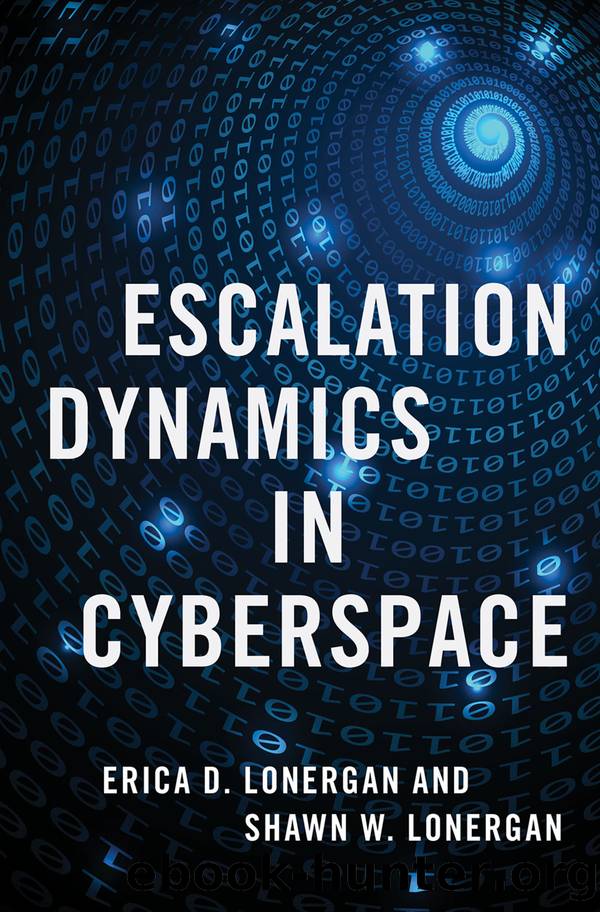Escalation Dynamics in Cyberspace by Erica D. Lonergan;Shawn W. Lonergan;

Author:Erica D. Lonergan;Shawn W. Lonergan;
Language: eng
Format: epub, pdf
Publisher: Oxford University Press USA
Published: 2023-06-15T00:00:00+00:00
The United States and North Korea
One might argue that the United States avoided escalating in response to Russian and Chinese behavior in cyberspace because it feared potential retaliation by those states, given their significant capabilities. By extension, one might expect that United States would be more willing to escalate in contests where it has a clearer advantage; in other words, against rivals over which it has a preponderant military advantage. The United Statesâ interactions with North Korea and Iran meet these characteristics. Indeed, the available, public evidence does suggest that the United States appeared to be more willing to employ cyber capabilities in response to or as part of its strategic interactions with those states. That said, none of the activity could reasonably be characterized as escalatory.
In this section, we evaluate what is arguably the most well-known interaction between the United States and North Korea in cyberspace: the 2014 Sony Hack, carried out by a threat actor known as the Lazarus Group, with links to North Korea.128 In Chapter 6, we will explore the role of cyber operations in the context of the 2017 crisis between the two states, where there was a real and meaningful risk that the situation would escalate to war. The 2014 Sony Hack was part of a failed coercive attempt by Pyongyang to prevent the release of a film, The Interview, that it perceived as portraying the regime in a negative light. The U.S. response to the Sony Hack provides further support for the contention that cyber operations are not likely to cause escalation. However, we acknowledge that this case does not represent a hard test of our theory.
North Koreaâs cyber operation against Sony Pictures is an example where the risks of escalation are not as salient as in other cases. North Korean threat actors targeted a private company in the entertainment sector, not an essential part of critical infrastructure. And while the Sony hack was the âmost elaborate cyberattack from [North Korea] on US soil,â it served different strategic purposes than other cyber attacks because it was aimed at preventing a private company from releasing what Pyongyang perceived to be an embarrassing film, rather than achieving a geopolitical objective.129 Even so, there were some concerns that the threat actors would follow through with threats to carry out a terrorist attack if their demands were not met. Regardless, it is notable that the U.S. response was similar to that in other cases: limited to diplomatic, legal, and economic instruments. Moreover, the situation did not escalate and is consistent with the type of tit-for-tat dynamics that have played out across the other cases.
The Interview depicted two U.S. journalists conscripted by the Central Intelligence Agency to assassinate North Koreaâs Kim Jong Un. On November 21, several top Sony executives received a cryptic email from a group calling themselves GodâsApstls demanding monetary compensation or else âSony would be bombarded as a whole.â130 Additionally, Sonyâs Twitter feed was taken over and displayed a message stating that the two co-chairs of Sony were âgoing to hell.
Download
Escalation Dynamics in Cyberspace by Erica D. Lonergan;Shawn W. Lonergan;.pdf
This site does not store any files on its server. We only index and link to content provided by other sites. Please contact the content providers to delete copyright contents if any and email us, we'll remove relevant links or contents immediately.
Verus Israel: Study of the Relations Between Christians and Jews in the Roman Empire, AD 135-425 by Marcel Simon(546)
Caesar Rules: The Emperor in the Changing Roman World (c. 50 BC â AD 565) by Olivier Hekster(515)
Infocracy by Byung-Chul Han(505)
Europe, Strategy and Armed Forces by Sven Biscop Jo Coelmont(476)
Banned in the U.S.A. : A Reference Guide to Book Censorship in Schools and Public Libraries by Herbert N. Foerstel(441)
Reading Colonial Japan by Mason Michele;Lee Helen;(440)
Give Me Liberty, Seventh Edition by Foner Eric & DuVal Kathleen & McGirr Lisa(431)
The Roman World 44 BC-AD 180 by Martin Goodman(427)
DS001-THE MAN OF BRONZE by J.R.A(417)
The Dangerous Life and Ideas of Diogenes the Cynic by Jean-Manuel Roubineau(412)
The Oxford History of World War II by Richard Overy(409)
Introducing Christian Ethics by Samuel Wells and Ben Quash with Rebekah Eklund(406)
Imperial Rome AD 193 - 284 by Ando Clifford(403)
Literary Mathematics by Michael Gavin;(372)
american english file 1 student book 3rd edition by Unknown(371)
Basic japanese A grammar and workbook by Unknown(352)
Language Hacking Mandarin by Benny Lewis & Dr. Licheng Gu(348)
How to Reach the 9.0 in IELTS Academic Reading by IELTS Medical(329)
The Oxford History of the Renaissance by Campbell Gordon;(328)
